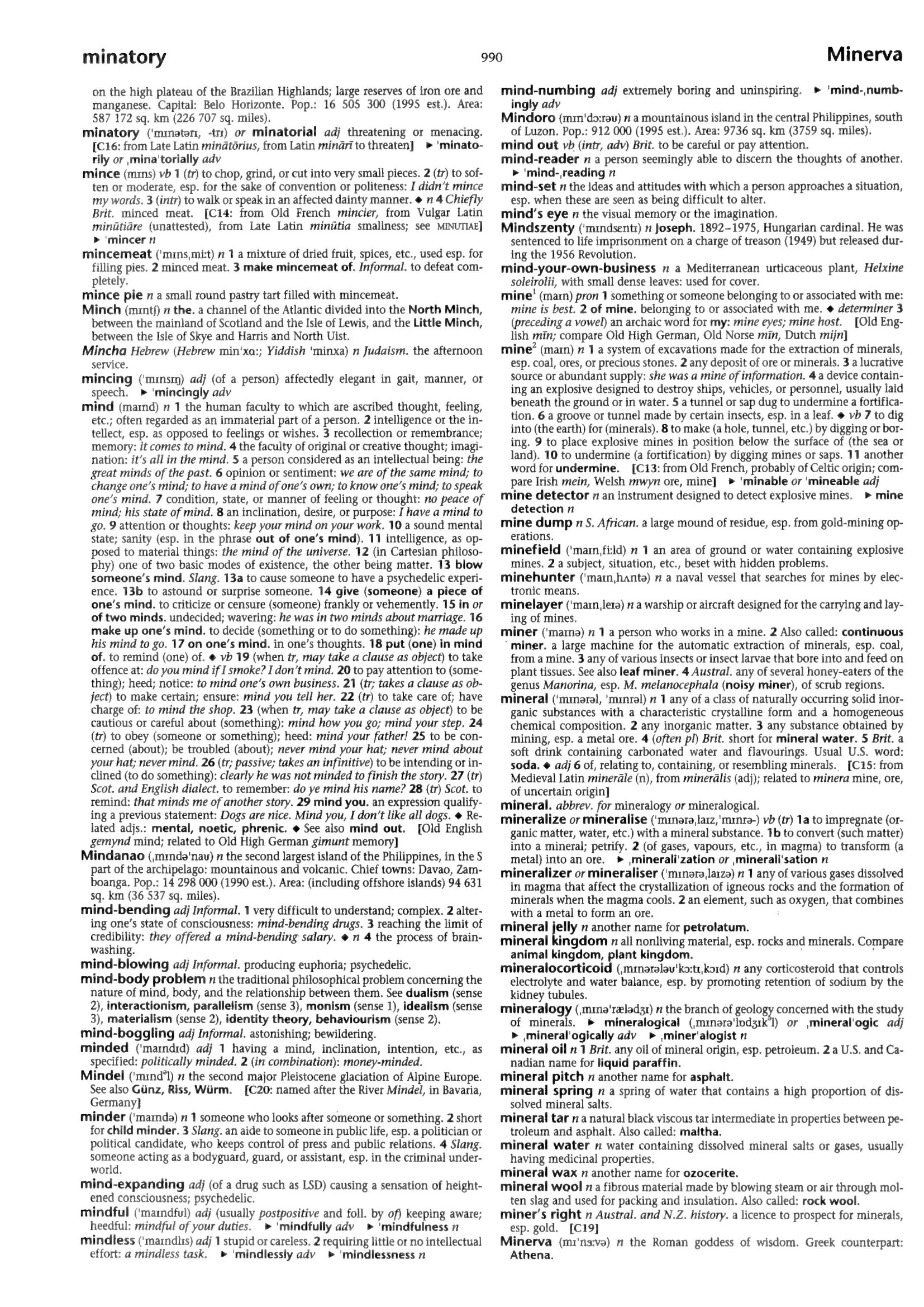Definition of "Mind"
Source: Collins English Dictionary. Millennium Edition
S.v., Mind
| 1. | n. |
the human faculty to which are ascribed thought, feeling, etc.; often regarded as an immaterial part of a person. |
| 2. |
intelligence or the intellect, esp. as opposed to feelings or wishes. |
|
| 3. |
recollection or remembrance; memory: it comes to mind. |
|
| 4. |
the faculty of original or creative thought; imagination: it’s all in the mind. |
|
| 5. |
a person considered as an intellectual being: the great minds of the past. |
|
| 6. |
opinion or sentiment; we are of the same mind; to change one’s mind; to have a mind of one’s own; to know one’s mind; to speak one’s mind. |
|
| 7. |
condition, state, or manner of feeling or thought: no peace of mind; his state of mind. |
|
| 8. |
an inclination, desire, or purpose: I have a mind to go. |
|
| 9. |
attention or thoughts: keep your mind on your work |
|
| 10. |
a sound mental state; sanity (esp. in the phrase out of one’s mind). |
|
| 11. |
intelligence, as opposed to material things: the mind of the universe. |
|
| 12. |
(in Cartesian philosophy) one of two basic modes of existence, the other being matter. |
|
| 13. |
blow someone’s mind. Slang. |
|
| 13a. |
to cause someone to have a psychedelic experience. |
|
| 13b. |
to astound or surprise someone. |
|
| 14. |
give (someone) a piece of one’s mind. to criticize or censure (someone) frankly or vehemently. |
|
| 15. |
in or of two minds. undecided; wavering: he was in two minds about marriage. |
|
| 16. |
make up one’s mind. to decide (something or to do something): he made up his mind to go. |
|
| 17. |
on one’s mind. in one’s thoughts. |
|
| 18. |
put (one) in mind of. to remind (one) of. |
|
| 19. | v. |
(when tr, may take a clause as object) to take offence at: do you mind if I smoke? I don’t mind. |
| 20. |
to pay attention to (something); heed; notice: to mind one’s own business. |
|
| 21. |
(tr; takes a clause as object) to make certain; ensure: mind you tell her. |
|
| 22. |
(tr) to take care of; have charge of: to mind the shop. |
|
| 23. |
(when tr, may take a clause as object) to be cautious or careful about (something): mind how you go; mind your step. |
|
| 24. |
(tr) to obey (someone or something); heed: mind your father! |
|
| 25. |
to be concerned (about); be troubled (about); never mind your hat; never mind about your hat; never mind. |
|
| 26. |
(tr; passive; takes an infinitive) to be intending or inclined (to do something): clearly he was not minded to finish the story. |
|
| 27. |
(tr) Scot. and English dialect. to remember: do ye mind his name? |
|
| 28. |
(tr) Scot. to remind: that minds me of another story. |
|
| 29. |
mind you. an expression qualifying a previous statement: Dogs are nice. Mind you, I don’t like all dogs. |
Treffry, CED ME, 990. [View as image] [Read on OMNIKA]
Page Image(s)

Example sentences
Coming soon.
Citation
PsychLing Contributors. "Mind." PsychLing, OMNIKA Foundation, 24 Jul. 2023, psylng.org/mli/indo/eng/mind. Accessed 22 Feb. 2026.
Bibliography
Bosworth, Joseph, and Thomas Northcote Toller, ed. An Anglo-Saxon Dictionary: Based on the Manuscript Collections of the Late Joseph Bosworth. Oxford, England: Clarendon Press, 1898.
Internet Archive Contributors. "Wayback Machine." San Francisco, CA: Internet Archive. Created October 24, 2001. Accessed July 21, 2023. https://web.archive.org. [Visit]
Mallory, James P., and Douglas Q. Adams. The Oxford Introduction to Proto-Indo-European and the Proto-Indo-European World. Oxford, United Kingdom: Oxford University Press, 2006.
Treffry, Diana, ed. Collins English Dictionary: Millennium Edition. 4ed. Glasgow, Great Britain: HarperCollins Publishers, 1998.
Wales, Jimmy D., et al. "Wiktionary: The Free Dictionary." San Francisco, CA: Wikimedia Foundation, Inc. Created December 12, 2002. Accessed July 28, 2023. https://wiktionary.org. [Visit]
PsychLing MLI
*men- is a reconstructed root from the proto-language known as Proto-Indo-European. Scholars believe that it means "think; consider."
Read morePsychLing Glossary
Language is a term in
PsychLing Glossary
Language Family is a term in
PsychLing Glossary
Proto-Language is a term in
PsychLing Glossary
Psycholinguistics is a field of study that concerns the scientific study of the relationship between human behavior and language.
Read morePsychLing Glossary
Reconstruction is a term in

